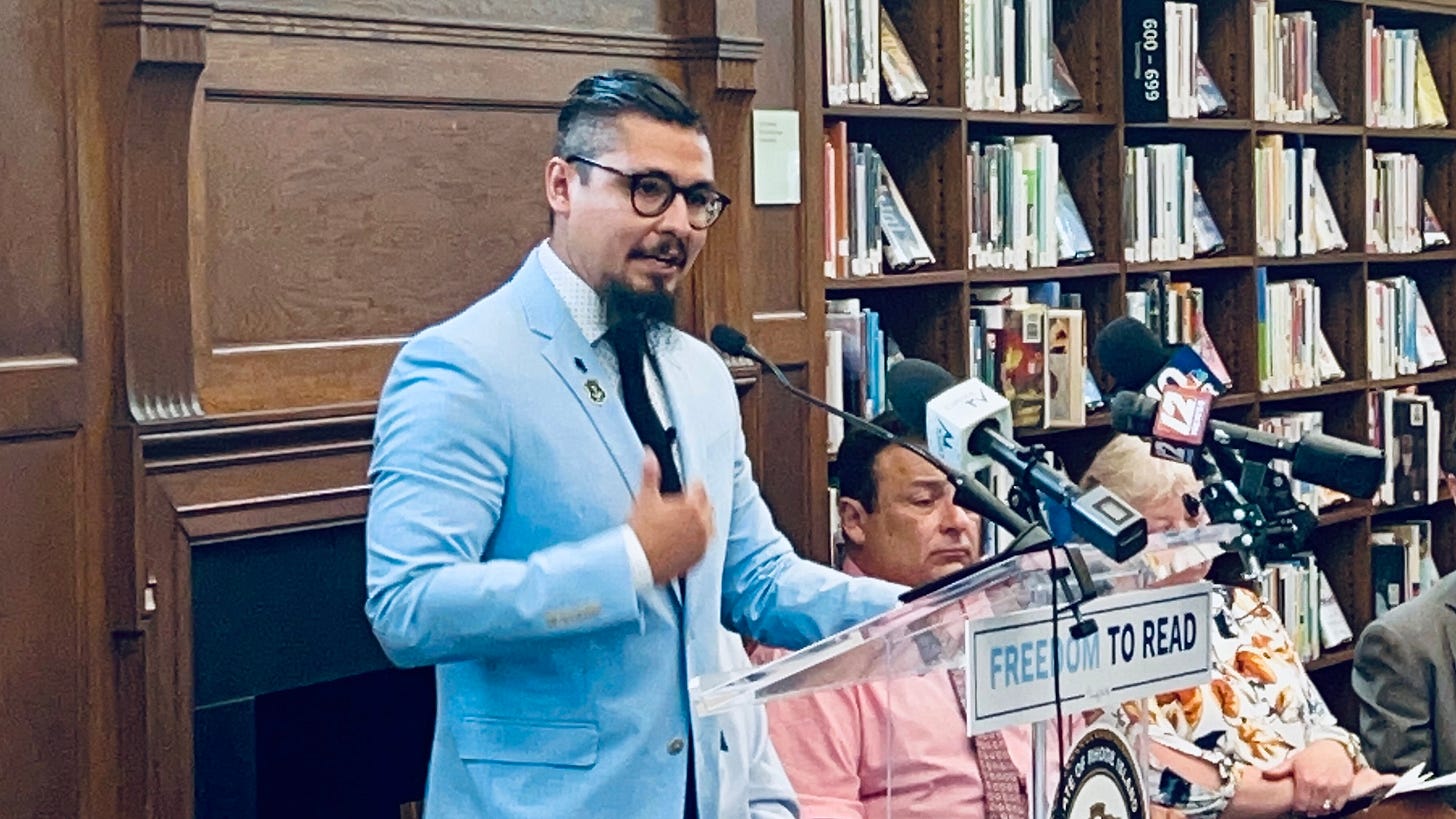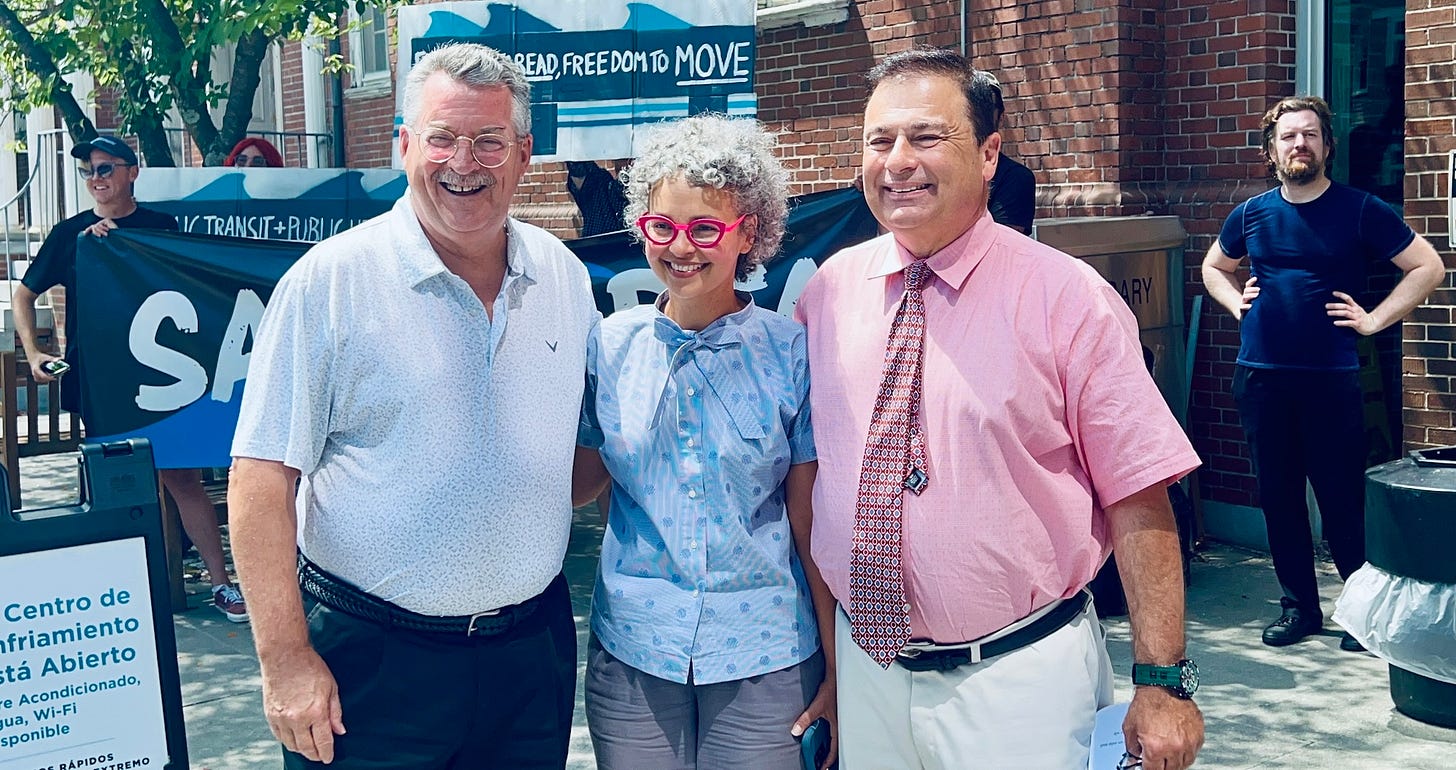With the Freedom to Read Act, Rhode Island pushes back against ignorance
“Your freedom to express and encounter ideas is protected in Rhode Island. Rhode Island’s Freedom to Read Act is the strongest of any freedom to read law enacted to date."
The Freedom to Read Act was ceremonially signed by the governor at the Rochambeau Library in Providence on Tuesday. The legislation encourages library selections that provide a wide range of viewpoints and prohibits the censorship of library materials. It mandates the creation of a model policy for materials in public and school libraries. It protects library staff from civil and criminal liability for following that model policy in good faith.
The legislation encourages library selections that provide a wide range of viewpoints and prohibits the censorship of library materials. It mandates the creation of a model policy for materials in public and school libraries, and it offers library staff protection from civil and criminal liability for following that model policy in good faith.
[Before and during the event, transit riders in support of public transportation held signs advocating for the proper funding of RIPTA. I covered that separately here.]
Here’s the video:
“Today is a celebration for all Rhode Islanders. Your stories, history, and identity matter, and they will be written, illustrated, taught, and made available to you across our small but mighty state,” said Cheryl Space, Director of the Community Libraries of Providence. “Your freedom to express and encounter ideas is protected in Rhode Island. As Laura Benitez, State Policy Manager for PEN America, said, ‘Rhode Island’s Freedom to Read Act is the strongest of any freedom to read law enacted to date.”
Representative David Morales, who sponsored the bill in the House, explained the need for the legislation.
“It was the urgency that arose from public and school librarians, educators, students, youth leaders, faith leaders, and local authors who recognized that we are in a moment of history where unprecedented censorship efforts are being posed against trends related to racial justice, immigration rights, and LGBTQ+ community members,” said Representative Morales (Democrat, District 7, Providence). “And instead of backing down or feeling intimidated by the attacks at the federal level and some that have happened right here in our backyard, we took the initiative to gather grassroots organizers to sit down and have a conversation as to how we authentically protect our students, library patrons, and frontline libray workers who are staffing the libraries day in and day out.
“That became the Freedom to Read Act. We were able to build a broad coalition to say that all of our neighbors deserve the freedom to read, freedom of expression, and the freedom to be true to who they are without the guilt, intimidation, or concern that one is going to be judged or have their freedoms stripped away through censorship.
“As we look ahead, it’s important that we recognize that we have made progress to protect access to literature, but now it’s about expanding that access, and that looks like making sure that every public school is entitled to a public library. It’s about making sure that every neighborhood has a library that’s open until 8 pm and on weekends. It’s about making sure that our neighbors can access the library through public transportation.
“I say all this because public libraries are a public good. They are our local town squares, especially for working people, families, and students. Community libraries are where neighbors gather together because not all of us have access to a recreation center. Not all of us can afford a cup of coffee to get out of the house. But what we can count on is our libraries - our public institutions. We must ensure that these public institutions are protected, but most importantly, receive the investments they deserve.”
“We can decide what books we want to check out from the library and what our children read or don’t read. But what we can’t do is decide what everyone else gets to read or what other people’s children get to read or not read,” said Senator Mark McKenney (Democrat, District 30, Warwick). “Reading is a gift, and it is so important that we stay protective of the gift of reading and that when someone wants to take it away, whether by banning books directly or by launching lawsuits attempting to intimidate libraries, schools, and librarians because of a book they have on their shelves, we fight.”
“Public libraries are the lifeblood of the community,” said Nicole Dyszlewski, lawyer, law professor, librarian, and one of the leaders of the Rhode Island Freedom to Read Coalition. “Thank you for everything you have done to get Rhode Island, the smallest state, to pass a groundbreaking bill. Thank you for recognizing the importance of libraries. As one of the leaders of the Freedom to Read Coalition, I can say with absolute certainty that this new Freedom to Read law is an important moral statement. The passage of the bill and signing of this law sends the message that all stories have value.
“The voices and stories of all children, library patrons, immigrants, moms, LGBTQIA, young adults, members of faith communities, artists, people struggling with drug addiction or thoughts of self-harm, writers and illustrators, historians, researchers, creators, and scholars, have value. All of their voices have value.
“This law affirms that you don’t have to agree with someone to recognize the value of their story, voice, or humanity. The Rhode Island Freedom to Read Coalition believes that this is the lesson we all need to hear right now in libraries, schools, publishing houses, homes, and the State House. Today, Rhode Island is sending that message loud and clear.
“We have tirelessly advocated. We have educated the public. Some of us designed logos, created and wrote out postcards about the passage of this law to protect and affirm the free speech rights of authors and to uplift an individual’s right to make their own decisions in what they read.
“We have rallied to support librarians as professionals with ethics and standards. We have innovated in this work by codifying a private right of action to allow efficient redress at the state level when these important rights are not respected. That is to say, this law is not performative. What we are doing here is not for show. Rhode Island means business. This law, sponsored by these legislators and signed by this governor, is now a model for legislators, advocates, activists, and librarians in other states who understand that access to the writings of any one of us is an expression of justice for all of us.”
Speaker of the House K. Joseph Shekarchi and Senate President Valerie Lawson also spoke at the event. Representative Jennifer Stewart, who originally introduced the bill, and Representatives Megan Cotter and David Bennett, supporters of the legislation, were present for the ceremony.




This is just the BEST‼️ Proud of Little Rhody.😍
Replace McKee with Morales